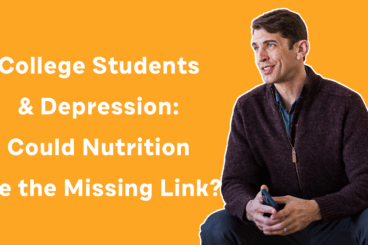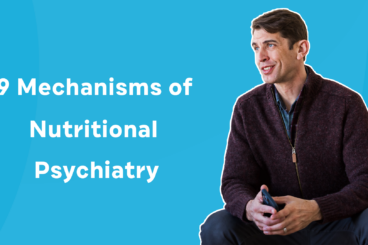Let’s talk about the evidence for nutritional psychiatry. So many people make claims about mental health and food and nutrition. It’s sometimes hard to sort out what’s true and what’s not. So I wanted to walk you through all of the evidence. I’m a clinician so I see patients every week and getting the treatments right, depends on looking at where there’s evidence. The good news is, there’s been a lot of evidence coming out in nutritional psychiatry.
Let’s start with the classic 2017 paper. It is in Lancet psychiatry, a very well respected journal, and it’s simply making the case that all other fields of medicine talk about nutrition so psychiatry needs to as well. In fact, they argue nutritional medicine should be mainstream in psychiatry. This is based on on some previous studies looking at correlations between depression risk and dietary pattern. In fact, this led to an article, which included a set of prevention guidelines, simply stating the importance of eating a more traditional style diet and getting off of highly processed foods based on the data. It can prevent depression by reducing the risk.
There is another study that looked at 10,000 university students and followed them over four and a half years. It found those students who ate most like a Mediterranean style diet, had a greatly reduced risk of depression. In fact, in their models, they found between a 30 to 50% risk of depression when you looked at those eaters who were most Mediterranean style in their diet compared with other other students who were eating more processed food. But, we all know these correlational studies don’t equal causation.
That’s why it’s been very exciting to see a new set of randomized control trials come out. These started in 2017 with the SMILES trial, which is the first and arguably most important trial in nutritional psychiatry. The study followed 67 individuals who were already getting some mental health treatment and gave them a Mediterranean style diet by seven nutritional counseling sessions versus a befriending protocol. What they found is about one third of the individuals who received the nutritional intervention went into full remission. That might not sound like a big number, but it really is in mental health. Getting one third of people with treatment resistant depression into full remission would be an amazing accomplishment.
Later that year, the HELFIMED trial was published. This was another similar trial that used a group cooking class as an intervention to teach a Mediterranean style diet to really depressed individuals. This study shows that these patients could not only adopt a Mediterranean style diet, but it improved their depression scores by 45% over three months and then that lasted for six months. This was a really powerful trial.
This trial is then followed by an interesting study in Australia. Heather Francis looked at depressed college freshmen who had poor eating habits and a lot of symptoms of depression. They gave those individuals a small box of food, which had olive oil and some spices, nuts and nut butter along with lots of recipes and encouragement to adopt a more Mediterranean style diet. They showed these students a 13 minute video and then called them a week later for five minutes and asked how the Mediterranean diet is going, tried to encourage them and then gave them a second phone call. What they found in the study was a drastic reduction in depression, anxiety, and stress rating scales in those college freshmen over the next three months. This is another exciting trial demonstrating that intervening with food can help to prevent and treat depression.
Finally, recently there was the AMEND trial. This was the first trial ever to look at depression treatment in young men using nutritional intervention. They found that a hundred percent of those young men who were given a nutritional intervention for depression, not only adopted some of those food changes, but had some mood responses.
This is all to say that nutritional psychiatry certainly doesn’t look like a scam in the sense of the evidence, which has been growing since about 2015 with multiple randomized controlled trials, demonstrating that when we help patients with depression eat a more nutrient dense diet adhering to the principles of nutritional psychiatry, we can make a big difference in terms of people’s mood.



